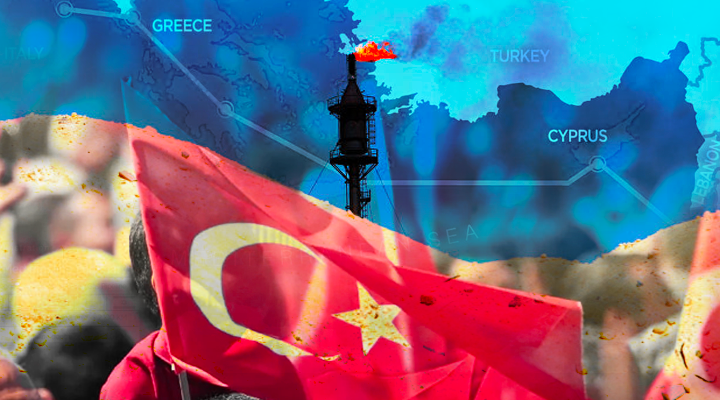By Adem Kılıç*
In the wake of the US withdrawing its backing for the EastMed pipeline Project, which was planned chiefly in countries bordering the Mediterranean Sea, discussions on the larger emerging political reality around the pipeline are sparking up as well.
The project, which was intended to transport gas reserves located in the Mediterranean Sea (and in particular reserves in the Israeli Exclusive Economic Zone) to the Island of Crete, Greece and Europe in an undersea pipeline, was to be completed within seven years and cost approximately $10 billion.
The proponents of the EastMed Project were Greece, the Greek Cypriot Administration of Southern Cyprus, Egypt and Israel, and the project also found support from former US President Donald Trump. Indeed, then US Secretary of State Mike Pompeo attended the international meeting on the project in 2019 and stated the absolute support of the United States.
The Trump administration made statements that the EastMed Project would mitigate Europe’s energy dependence on Russia. However, the United States later withdrew its support for the project when Biden became president.
Why did the new administration of the United States withdraw its support? The answer to this question is to be found in an analysis of the international political situation and the balance of power in the Mediterranean.
Firstly, the Biden administration states reservations about the economic viability of the project. According to an analysis in the US press, an easy and rational way for the reserves to be transported to Europe via Turkey in order for the project to be efficient exists, and changing the route would help increase costs and make the viability of the project more demanding. In other words, the Biden administration does not consider the project pragmatic.
Secondly, there are conflicting regional realities in implementing the EastMed Project.
Turkey’s objections and actions have tipped the balance in the Eastern Mediterranean in its favor, and that is what really bothers the Biden administration.
To this point, a note was sent by Washington to Athens, which stated that “Trying to implement the EastMed Project by ignoring Turkey and other countries of the region will elevate rigidity in the region.”
What actions can Greece take now?
Firstly, Greece will try to engage with Brussels and, as it has tried before, attempt to ensure that the European Union makes decisions that will oppose Turkey.
But, as we have seen in recent instances, Greece’s main supporter in the EU on this issue will again be France. Indeed, Greece is aware of this, and the Greek authorities have indicated that they could purchase ammunition from France.
Another piece of ammunition for Greece is the 12-mile conflict, which will elevate tensions in the region as it has numerous times in the past.
In October 1970, the chief district of dispute between Turkey and Greece regarding maritime jurisdiction was formed in the Aegean Sea, and since the 1990s, the Eastern Mediterranean dimension has been attached to it.
In 1995, Turkey achieved consensus in Parliament that if Greece expanded its territorial waters beyond 6 miles in the Aegean, it would be considered a inducement of war and the Government of the Republic of Turkey would be given the necessary military powers.
The oil and natural gas reserves discovered in the Eastern Mediterranean in the early 2000s have further elevated the strategic importance of the region and triggered a crisis.
Although the parties in question are predominantly Turkey and Greece, considering that the Eastern Mediterranean is both the gateway to the Middle East and the shortest path to South Asia and the Far East by sea, it is clear why other global powers are interested in the region.
Russia, which was not in the equation until 10 years ago, has taken steps to become a spoken country in the region. Over the past 10 years, Russia has made moves to fill the power vacuum that has formed in this region. Russia strengthened its military position in Syria, expanded its naval capacity and added a large air base in the country. It is evident that Russia will attempt to exert influence throughout the Eastern Mediterranean after settling there.
Russia’s intent is to establish permanent military bases in Libya and then Syria to demonstrate to the countries of the region that it is a permanent presence in the Eastern Mediterranean, that it is an ally worth cooperating with, and will have influence in the region. This development will help Turkey balance the threat from the West.
It is evident that the United States has terminated or reduced its engagement in many regions in accordance with its “pivot toward Asia”. However, Washington has not abandoned its plans in the Middle East and the Mediterranean and is attempting to settle deeper into the Eastern Mediterranean.
These factors and Turkey’s steps in accordance with international law, Libya’s agreement with the UN-recognized UMH government and the Gun boat diplomacy it utilizes when necessary have made Turkey a permanent force in the Eastern Mediterranean.
There is no unity in Europe on this issue. Not all of Europe has taken a pro-Greek position. There is no evidence to suggest that Greece will find supporters other than France.
Turkey, with the steps it has taken and the diplomacy it has applied while maintaining its decisive stance, is proving its theses to all relevant countries and institutions. By focusing on diplomacy and reducing tensions in the region, Turkey is gradually finding recompense, and this trend will only continue in the foreseeable future.
* Political Scientist

















Leave a Reply